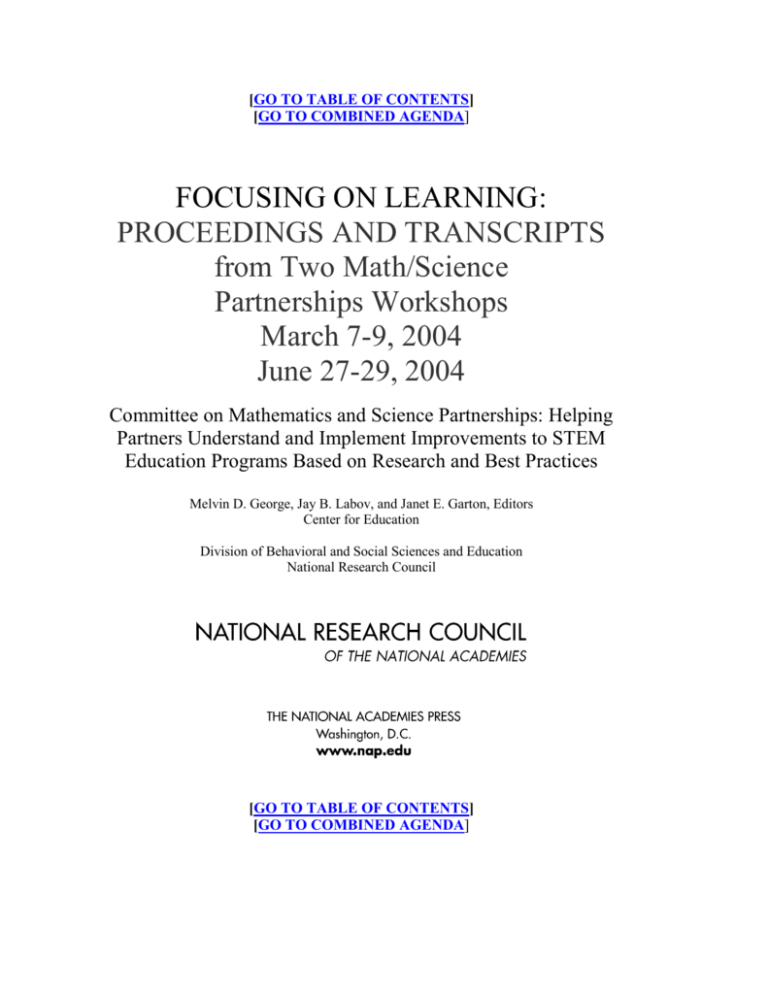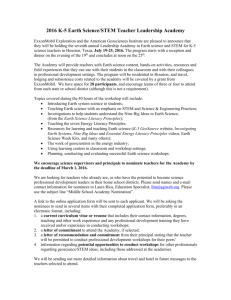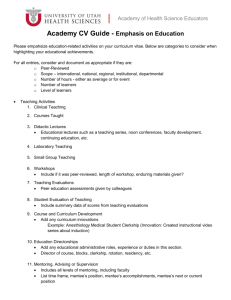
[GO TO TABLE OF CONTENTS]
[GO TO COMBINED AGENDA]
FOCUSING ON LEARNING:
PROCEEDINGS AND TRANSCRIPTS
from Two Math/Science
Partnerships Workshops
March 7-9, 2004
June 27-29, 2004
Committee on Mathematics and Science Partnerships: Helping
Partners Understand and Implement Improvements to STEM
Education Programs Based on Research and Best Practices
Melvin D. George, Jay B. Labov, and Janet E. Garton, Editors
Center for Education
Division of Behavioral and Social Sciences and Education
National Research Council
[GO TO TABLE OF CONTENTS]
[GO TO COMBINED AGENDA]
THE NATIONAL ACADEMIES PRESS • 2101 Constitution Avenue N.W. • Washington, DC 20418
NOTICE: The project that is the subject of this report was approved by the Governing Board of the
National Research Council, whose members are drawn from the councils of the National Academy of
Sciences, the National Academy of Engineering, and the Institute of Medicine. The members of the
committee were chosen for their special competences and with regard for appropriate balance.
This workshop was conducted under an award from the National Science Foundation as part of the
Research, Evaluation, and Technical Assistance component of the Math/Science Partnerships Initiative
(Award # EHR-0236511). Any opinions, findings, conclusions, or recommendations expressed in this
report are those of the individual participants of the workshop and do not necessarily reflect the views of
the sponsors.
Library of Congress Cataloging-in-Publication Data
ISBN 0-309-09656-1
Additional copies of this report are available from
The National Academies Press
2101 Constitution Avenue, NW
Box 285
Washington, DC 20055
800/624-6242
202/334-3313 (in the Washington Metropolitan Area)
<http://www.nap.edu>
Copyright 2005 by the National Academy of Sciences. All rights reserved.
Printed in the United States of America.
Suggested citation:
National Research Council. (2005). Focusing on Learning: Proceedings from a f Math/Science
Partnerships Workshop. Committee on Mathematics and Science Partnerships: Helping Partners
Understand and Implement Improvements to STEM Education Programs Based on Research and Best
Practices. M.D. George, J.B. Labov, and J.E. Garton, Eds. Center for Education. Division of Behavioral
and Social Sciences and Education Washington, DC: The National Academies Press.
Included in these Proceedings are transcripts of the presentations and discussion sessions that took place
during the Mathematics and Science Partnerships Workshops on How People Learn. Some editing has been
made to clarify these transcriptions without in any way altering the original meaning of any presenter or
discussant. The transcripts were prepared by CASET Associates and are not official reports of the National
Academy of Sciences, National Academy of Engineering, Institute of Medicine, or National Research Council
(collectively “National Academies”). Opinions and statements included in the transcripts are solely those of
the individual persons or participants at the workshop, and are not necessarily adopted or endorsed or verified
as accurate by The National Academies.
The links to websites that provide additional information to users of this CD-ROM were operative as of March
23, 2005. However, changes to websites and relocated information may render certain links inoperative in the
future.
The National Academy of Sciences is a private, nonprofit, self-perpetuating society of distinguished scholars engaged
in scientific and engineering research, dedicated to the furtherance of science and technology and to their use for the
general welfare. Upon the authority of the charter granted to it by the Congress in 1863, the Academy has a mandate
that requires it to advise the federal government on scientific and technical matters. Dr. Ralph J. Cicerone is president
of the National Academy of Sciences.
The National Academy of Engineering was established in 1964, under the charter of the National Academy of
Sciences, as a parallel organization of outstanding engineers. It is autonomous in its administration and in the selection
of its members, sharing with the National Academy of Sciences the responsibility for advising the federal government.
The National Academy of Engineering also sponsors engineering programs aimed at meeting national needs,
encourages education and research, and recognizes the superior achievements of engineers. Dr. Wm. A. Wulf is
president of the National Academy of Engineering.
The Institute of Medicine was established in 1970 by the National Academy of Sciences to secure the services of
eminent members of appropriate professions in the examination of policy matters pertaining to the health of the public.
The Institute acts under the responsibility given to the National Academy of Sciences by its congressional charter to be
an adviser to the federal government and, upon its own initiative, to identify issues of medical care, research, and
education. Dr. Harvey V. Fineberg is president of the Institute of Medicine.
The National Research Council was organized by the National Academy of Sciences in 1916 to associate the broad
community of science and technology with the Academy’s purposes of furthering knowledge and advising the federal
government. Functioning in accordance with general policies determined by the Academy, the Council has become the
principal operating agency of both the National Academy of Sciences and the National Academy of Engineering in
providing services to the government, the public, and the scientific and engineering communities. The Council is
administered jointly by both Academies and the Institute of Medicine. Dr. Ralph J. Cicerone and Dr. Wm. A. Wulf are
chairman and vice chairman, respectively, of the National Research Council.
COMMITTEE ON MATHEMATICS AND SCIENCE PARTNERSHIPS: HELPING
PARTNERS UNDERSTAND AND IMPLEMENT IMPROVEMENTS TO STEM
EDUCATION PROGRAMS BASED ON RESEARCH AND BEST PRACTICES
MELVIN D. GEORGE, Chair, President Emeritus and Professor of Mathematics Emeritus, University of
Missouri-Columbia
HERBERT BRUNKHORST, Institute for Science Education, California State University, San Bernardino
MARY COLVARD, Department of Education, State of New York
JERRY P. GOLLUB, Department of Physics, Haverford College, PA
SUSAN HACKWOOD, California Council on Science and Technology
MARK KAUFMAN, TERC, Cambridge, MA
CARLO PARRAVANO, Merck Institute for Science Education, Rahway, NJ
ANDREW PORTER, Department of Leadership, Policy and Organizations, Vanderbilt University
WILLIAM TRENT, Department of Educational Policy Studies, University of Illinois, Urbana-Champaign
STAFF
JAY B. LABOV, Study Director and Co-PI, Center for Education
SALLY GOETZ SHULER, Co-PI, National Science Resources Center
JANET E. GARTON, Program Officer
TERRY L. HOLMER, Senior Project Assistant
[GO TO TABLE OF CONTENTS]
[GO TO COMBINED AGENDA]
Preface
The Mathematics/Science Partnership (MSP) initiative has a very important role to play
in improving Science, Technology, Engineering and Mathematics (STEM) education in
the United States. Through a series of targeted and comprehensive grants, the National
Science Foundation is supporting a series of experiments to allow formal partnerships
between institutions of higher education and K-12 schools and districts to work together
to improve mathematics and science learning for all children through reinvigorated and
challenging courses and pedagogy and strengthened preparation and professional
development of teachers of mathematics and science. The MSP initiative has high
expectations for evidence that these partnerships are achieving their goals. Additional
information about the MSP initiative funded by the National Science Foundation (NSF) is
available at
http://nsf.gov/funding/pgm_summ.jsp?pims_id=5756&org=EHR&from=fund.
The National Research Council (NRC) developed a project, part of the Research,
Evaluation, and Technical Assistance (RETA) component of the MSP initiative, to
provide a series of workshops over three years for both teams and individual
representatives from MSPs. The workshops were designed to assist people who are
involved with MSP projects and those who seek to become involved with this initiative
succeed in this significant and complex undertaking. Tools that will help them succeed
include a clear understanding of the recent and emerging research about ways to improve
learning and teaching in the nation’s schools and to measure learning and teaching
effectiveness in meaningful ways. Much of this research has been analyzed and
synthesized through studies, workshops, and other convening activities conducted by the
NRC.
The members of the steering committee who have guided this effort have broad and
varied expertise in STEM education and the research related to it in both K-12 and higher
education. Together with the superb staff—Jay Labov, Janet Garton, and Terry
Holmer—who have worked with us, the committee has developed a series of workshops
on various topics central to the work and themes of NSF’s MSP initiative. Our workshops
have been offered and are being planned to assist MSP grantees and future applicants
better understand the research literature and the implications and applications of that
evidence in the areas of learning, assessment of learning, teacher education for effective
teaching and learning, and the development of challenging courses in mathematics and
science. At least four workshops will be offered on the improvement of student learning,
and two workshops have been planned for each of the other topics. A special workshop
focusing on the higher education part of MSP partnerships will also be offered.
The NRC and steering committee have viewed the improvement of student learning and
achievement as the underlying theme for every workshop. This Proceedings reports on
activities that were parts of two workshops that focused on the research literature about
student learning. It emphasizes the research evidence that has been synthesized in the
NRC’s report How People Learn: Brain, Mind, Experience, and School: Expanded
Edition (National Research Council, 2000, National Academy Press) and provided
opportunities for participants to engage in the important concepts about learning and
teaching that are embodied in this report. The workshop included a series of “hands-on”
experiences with a specific set of learning challenges, plenary sessions, and several
smaller breakout sessions. Speakers who undertook some of the research described in
this report and several members of the study committees that produced it gave
presentations and answered questions both about the research on learning and its
implications for science and mathematics classrooms. Since our concern is always about
the transition from research to practice, we have included sessions led by people who are
using the information from How People Learn and related NRC reports in the educational
activities of their MSPs.
This report and future Proceedings from this MSP-RETA initiative are designed to
provide readers with accurate representations of the presentations and discussions at these
workshops. We present them in the hope that they will assist both the MSP community
and others who are trying to undertake similar work to accomplish the important tasks
that the nation needs done.
The agenda in this CD-ROM contains hyperlinks to the PowerPoint presentations,
background readings, references, and verbatim transcripts of presentations and
discussions during the workshops. Please note that none of the breakout sessions were
recorded; therefore, verbatim transcripts are not available for these sessions from either
workshop.
The NRC will issue a series of Proceedings for all workshop topics as those workshops
are completed. The information presented and the views expressed by presenters and
participants are their own and are not necessarily those of the National Research
Council.
I want to express deep gratitude to all members of the steering committee for
volunteering their help when needed to make the workshops more effective and useful. I
would also like to express my thanks to Patti Bourexis, our external evaluator, who
steadfastly provided us with reliable feedback and suggestions, based on direct
conversations with workshop participants, that strengthened the format and content of the
workshops. Finally, I express my appreciation on behalf of the steering committee and
the staff to all the presenters, discussants, facilitators, and participants in this workshop
for their hard work and dedication to finding new ways to improve science and
mathematics education in this nation that is based on and guided by research and
evidence.
Melvin D. George
Committee Chair
[GO TO TABLE OF CONTENTS]
[GO TO COMBINED AGENDA]
Acknowledgments
This proceedings and transcriptions have been reviewed in draft form by individuals
chosen for their diverse perspectives and technical expertise, in accordance with
procedures approved by the Report Review Committee of the National Research Council.
The purpose of this independent review is to provide candid and critical comments that
will assist the institution in making its published report as sound as possible and to ensure
that the report meets institutional standards for objectivity, evidence, and responsiveness
to the charge. The review comments and draft manuscript remain confidential to protect
the integrity of the process. We thank the following individuals for their review of this
report: Tom Keller, Science Education, Maine Department of Education, Augusta, ME;
Don McKinney, Educational Consultant, Chemical Heritage Foundation, Philadelphia,
PA; Emil Michal, Department of Physics, El Paso Community College, El Paso, TX;
Gwen Pollock, Science Section, Illinois State Board of Education, Springfield, IL.
Although the reviewers listed above provided many constructive comments and
suggestions, they were not asked to endorse the content of the report nor did they see the
final draft of the report before its release. The review of this report was overseen by
William G. Steenken, Consultant, Hamilton, OH. Appointed by the National Research
Council, he was responsible for making certain that an independent examination of this
report was carried out in accordance with institutional procedures and that all review
comments were carefully considered. Responsibility for the final content of this report
rests entirely with the author(s) and the institution.
[GO TO TABLE OF CONTENTS]
[GO TO COMBINED AGENDA]









